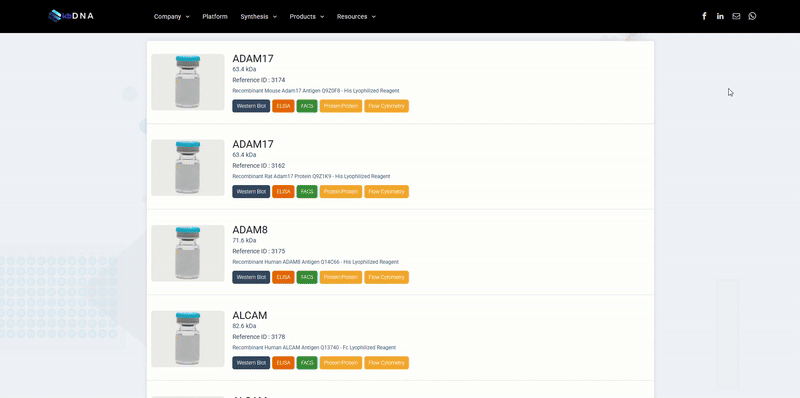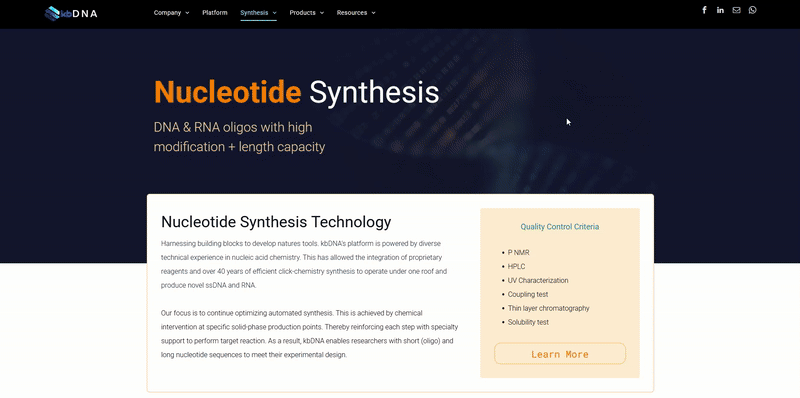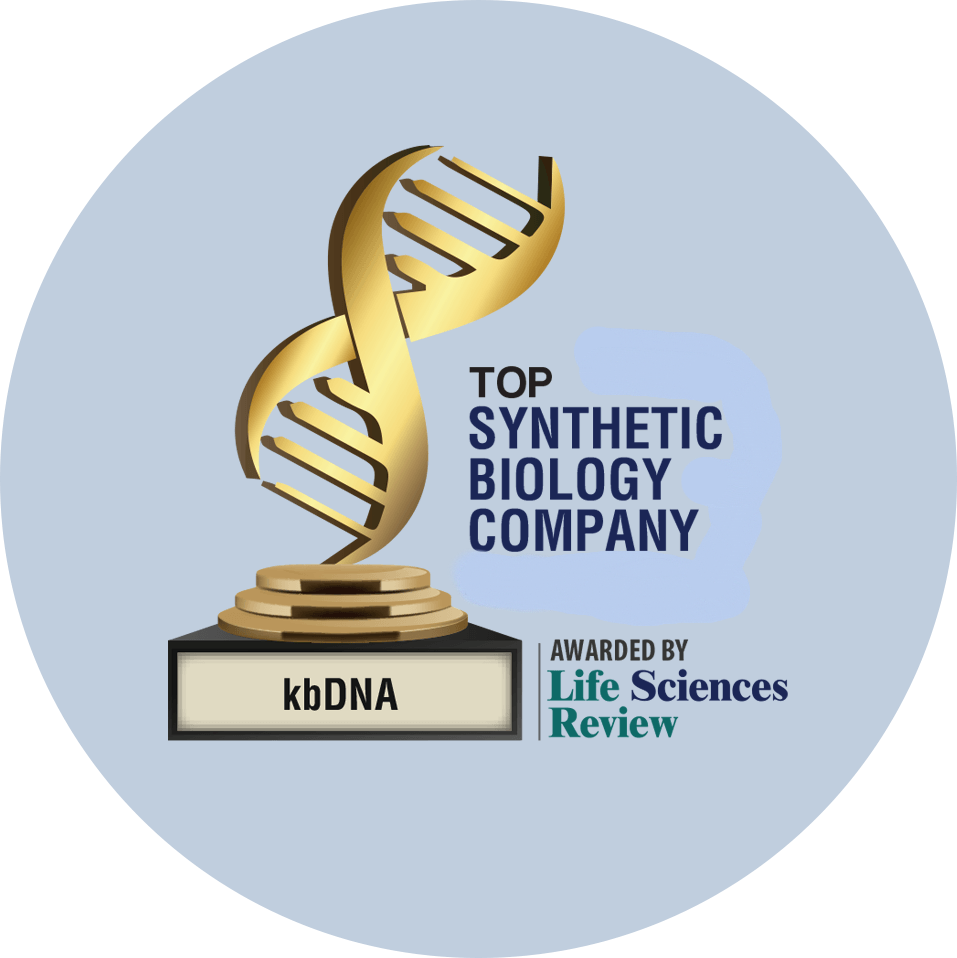BACE-1
Recombinant ID:
3906
Request Datasheet
Gene of Interest
Gene Synonyms:
Protein Names:
Accession Data
Organism:
Homo sapiens (Human)
Mass (kDa):
55764
Length (aa):
501
Sequence:
MAQALPWLLLWMGAGVLPAHGTQHGIRLPLRSGLGGAPLGLRLPRETDEEPEEPGRRGSFVEMVDNLRGKSGQGYYVEMTVGSPPQTLNILVDTGSSNFAVGAAPHPFLHRYYQRQLSSTYRDLRKGVYVPYTQGKWEGELGTDLVSIPHGPNVTVRANIAAITESDKFFINGSNWEGILGLAYAEIARPDDSLEPFFDSLVKQTHVPNLFSLQLCGAGFPLNQSEVLASVGGSMIIGGIDHSLYTGSLWYTPIRREWYYEVIIVRVEINGQDLKMDCKEYNYDKSIVDSGTTNLRLPKKVFEAAVKSIKAASSTEKFPDGFWLGEQLVCWQAGTTPWNIFPVISLYLMGEVTNQSFRITILPQQYLRPVEDVATSQDDCYKFAISQSSTGTVMGAVIMEGFYVVFDRARKRIGFAVSACHVHDEFRTAAVEGPFVTLDMEDCGYNIPQTDESTLMTIAYVMAAICALFMLPLCLMVCQWRCLRCLRQQHDDFADDISLLK
Proteomics (Proteome ID):
Beta-secretase 1 (EC 3.4.23.46) (Aspartyl protease 2) (ASP2) (Asp 2) (Beta-site amyloid precursor protein cleaving enzyme 1) (Beta-site APP cleaving enzyme 1) (Memapsin-2) (Membrane-associated aspartic protease 2)
Proteomics (Chromosome):
UP000005640
Mass Spectrometry:
N/A
Function [CC]:
Responsible for the proteolytic processing of the amyloid precursor protein (APP). Cleaves at the N-terminus of the A-beta peptide sequence, between residues 671 and 672 of APP, leads to the generation and extracellular release of beta-cleaved soluble APP, and a corresponding cell-associated C-terminal fragment which is later released by gamma-secretase. Cleaves APP with much more catalytic efficiency than for the wild-type. {ECO:0000269|PubMed:10656250, ECO:0000269|PubMed:10677483, ECO:0000269|PubMed:20354142}.
Metal Binding:
N/A
Site:
N/A
Tissue Specificity:
Expressed at high levels in the brain and pancreas. In the brain, expression is highest in the substantia nigra, locus coruleus and medulla oblongata. {ECO:0000269|PubMed:10677483, ECO:0000269|PubMed:11083922}.
Disease:
N/A
Mutagenesis:
MUTAGEN 93 93 D->N: Decreases beta-cleaved soluble APP production. {ECO:0000269|PubMed:10656250}.; MUTAGEN 284 284 D->N: Almost abolishes beta-cleaved soluble APP production. {ECO:0000269|PubMed:10656250}.; MUTAGEN 498 498 S->A: No effect on endocytosis from the cell surface. Increases recycling from endosomes to the cell surface. {ECO:0000269|PubMed:15615712, ECO:0000269|PubMed:15886016}.; MUTAGEN 498 498 S->D: No effect on endocytosis form the cell surface. Decreases recycling from endosomes to the cell surface. {ECO:0000269|PubMed:15886016}.; MUTAGEN 499 500 LL->AA: Impairs endocytosis and produces a delayed retrograde transport to the trans-Golgi network and delivery to the lysosmes, decreasinf its degradation. Disrupts location to late endosomes and lysosomes. Locates mainly at the cell surface. No effect on degradation regulated by GGA3. Effects on protein stability and defective internalization increases; when associated with R-501. {ECO:0000269|PubMed:15615712, ECO:0000269|PubMed:16033761, ECO:0000269|PubMed:20484053, ECO:0000269|PubMed:23109336}.; MUTAGEN 501 501 K->R: Inhibits ubiquitination. No effect on endocytosis rate. Induced protein stability and acculmulation in early and late endosomes, lysosomes and cell membrane. Effects on protein stability and defective internalization increases; when associated with A-499-500-A. {ECO:0000269|PubMed:20484053, ECO:0000269|PubMed:23109336, ECO:0000269|PubMed:27302062}.
Reagent Data
Name:
Beta-secretase 1 (EC 3.4.23.46) (Aspartyl protease 2) (ASP2) (Asp 2) (Beta-site amyloid precursor protein cleaving enzyme 1) (Beta-site APP cleaving enzyme 1) (Memapsin-2) (Membrane-associated aspartic protease 2)
Class:
Subcategory:
Recombinant
Molecular Weight:
Source:
Species:
Human
Amino Acid Sequence:
Tag:
Format:
Lyophilized
Formulation:
Sterile-filtered colorless solution
Formulation Concentration:
1mg/ml
Buffer Volume:
Standard
Buffer Solution:
PBS
pH:
7.4-7.5
Stabilizers
NaCl:
Null
Metal Chelating Agents
EDTA:
Null
Purity:
> 98%
Determined:
SDS-PAGE
Stained:
Inquire
Validated:
RP-HPLC
Sample Handling
Storage:
-20°C
Stability:
This bioreagent is stable at 4°C (short-term) and -70°C(long-term). After reconstitution, sample may be stored at 4°C for 2-7 days and below -18°C for future use.
Preparation:
Reconstitute in sterile distilled H2O to no less than 100ug/ml; dilute reconstituted stock further in other aqueous solutions if needed. Please review COA for lot-specific instructions. Final measurements should be determined by the end-user for optimal performance.












